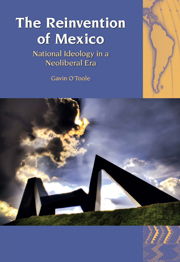2 - New Nationalism and Social Liberalism
from II - Construction: State Discourses
Summary
This chapter addresses a principal question generated by the Salinas reform process: whether nationalism remained of functional value as a legitimizing formula in Mexican politics in this neoliberal period. To do so, it examines how nationalism as a political doctrine was employed by President Salinas, his government and the PRI during his sexenio. Material from this period – speeches or published work by Salinas, his advisers and officials, and articles from the PRI magazine Examen – indicates that nationalism remained valuable to Salinas despite his ambition to reform the state based upon a neoliberal analysis, confirming the long-standing relationship in Mexico between state-building and nationalism. However, this was a different kind of nationalism: the Mexican president reformulated the legitimizing doctrine by articulating alongside a ‘new nationalism’ a doctrine of ‘social liberalism’ that can be likened to the patriotic liberalism of the nineteenth century. Together, these sought to provide a philosophical basis for a reconciliation between national ideology and liberalism by reformulating ideas concerning the individual and the social, so influencing prevailing notions of national citizenship.
The Analysis of Salinismo and State Reform
By the late 1970s, two key and related sources of critique of the Mexican state had evolved: a perception on the left that the post-revolutionary state faced or had entered a terminal crisis, due in part to a new phase in global capitalism; and an external, neoclassical reaction to Keynesianism that identified the interventionist state as the main cause of inflationary policies.
- Type
- Chapter
- Information
- The Reinvention of MexicoNational Ideology in a Neoliberal Era, pp. 43 - 74Publisher: Liverpool University PressPrint publication year: 2010

